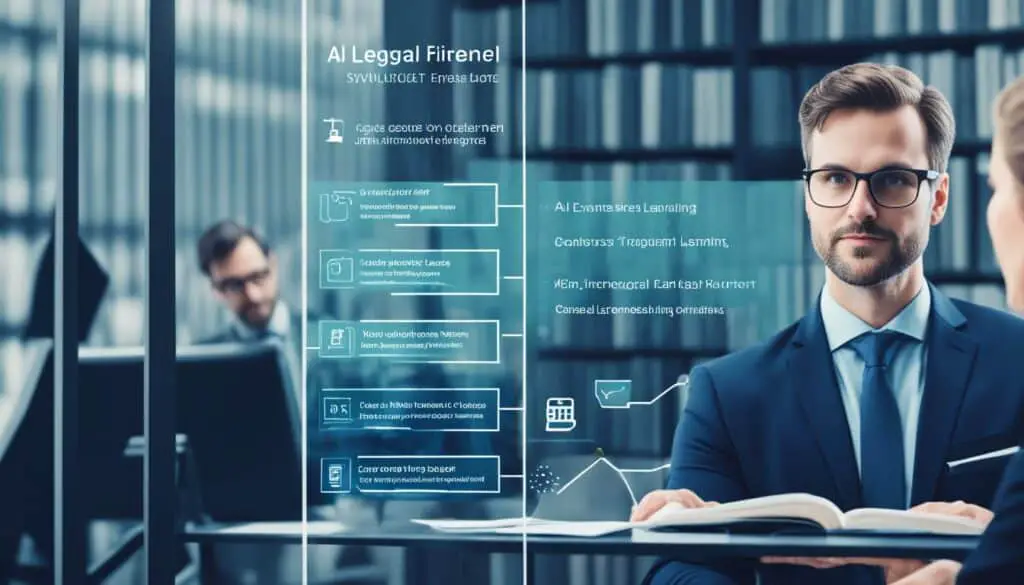
Legal research has always been a cornerstone of the legal profession, requiring hours of meticulous analysis, sifting through stacks of documents, and searching for relevant precedents. However, thanks to the advancements in artificial intelligence (AI), the landscape of legal research has been reshaped.
As an AI-powered technology, AI has introduced a new era of efficiency, accuracy, and effectiveness in legal research. In this article, I will delve into the benefits and implications of integrating AI in legal research, exploring how it can redefine the way attorneys uncover insights, streamline processes, and shape outcomes.
Key Takeaways:
- AI technology is revolutionizing legal research, offering unprecedented benefits for attorneys.
- AI-powered tools can analyze vast amounts of legal documents quickly and accurately, saving time for legal professionals.
- By automating repetitive tasks, AI enables attorneys to focus on higher-value work and strategic decision-making.
- AI algorithms can identify patterns and trends in legal data, leading to more informed and strategic legal outcomes.
- Ethical considerations, such as AI bias, require human oversight and intervention to ensure fairness and transparency in legal research.
Advantages of AI in Legal Research
AI technology has proven to be a game-changer in legal research due to its numerous advantages. Firstly, AI-powered tools can analyze vast amounts of legal documents and precedents in a fraction of the time it would take a human researcher, resulting in significant time savings for attorneys. Moreover, AI algorithms can provide accurate and relevant insights, improving the efficiency and reliability of legal research. By automating repetitive tasks, AI allows attorneys to focus on higher-value work and strategic decision-making.
AI enhances efficiency in legal research by quickly processing an immense volume of information. For example, imagine a case involving complex corporate law. Instead of manually reviewing countless contracts and legal precedents, AI-powered tools can swiftly scan and analyze relevant documents, allowing attorneys to identify key legal points more efficiently. The accuracy of AI in legal research prevents important information from being overlooked, minimizing the risk of errors and omissions that could negatively impact legal outcomes.
“AI technology in legal research streamlines processes, expedites tasks, and improves work quality. The time-saving benefits of AI are immense, enabling lawyers to use their precious time more effectively in other crucial areas of their practice.”
In addition to efficiency and accuracy, the time-saving benefits of AI in legal research cannot be overstated. AI algorithms can tirelessly work 24/7, ensuring uninterrupted progress even outside traditional working hours. This enables attorneys to meet tight deadlines, improve productivity, and deliver better outcomes for their clients. The speed and efficiency of AI in legal research can significantly reduce the overall duration of legal cases, providing clients with quicker resolutions and saving both time and money.
Streamlining the Legal Research Process
AI technology revolutionizes the legal research process by automating repetitive tasks that were once time-consuming for human researchers. By leveraging AI-powered tools, legal professionals can:
- Quickly locate relevant case law, statutes, and legal documents.
- Analyze and compare legal precedents in a fraction of the time.
- Identify patterns and trends in legal data to support legal arguments.
- Perform comprehensive due diligence in mergers and acquisitions.
The seamless integration of AI into legal research processes saves valuable time, allowing lawyers to focus on complex legal analysis, advising clients, and developing effective legal strategies.
The image above visually represents the efficiency in legal research achieved through the use of AI. It symbolizes the speed and accuracy of AI algorithms processing vast amounts of legal information, allowing attorneys to sift through mountains of data and extract valuable insights more effectively.
| Advantages of AI in Legal Research | Description |
|---|---|
| Efficiency | AI analyzes immense volumes of legal documents and precedents in seconds, saving valuable time for attorneys. |
| Accuracy | AI algorithms provide precise and reliable insights, minimizing errors and omissions. |
| Time-saving | AI-powered tools work continuously, delivering faster results and enhancing overall productivity. |
Impact of AI on the Legal Profession
The integration of AI in legal research is shaping the future of the legal profession, revolutionizing the way attorneys make decisions and handle cases. By harnessing advanced algorithms and data analysis capabilities, AI has the potential to transform legal outcomes and enhance the decision-making process.
AI algorithms have the ability to analyze vast amounts of data, including legal documents, precedents, and case law. This analysis enables AI to identify patterns and trends that may not be discernible to human researchers. By uncovering hidden insights, AI enhances the ability of attorneys to make informed and strategic decisions in their cases.
In addition to providing valuable insights, AI technology also ensures that attorneys have access to the most up-to-date information. Legal research can be a time-consuming and labor-intensive task, but AI-powered tools can quickly scan and analyze vast databases, delivering relevant information in a fraction of the time it would take a human researcher.
Furthermore, AI has the potential to improve the overall accuracy and efficiency of legal research. By automating repetitive tasks and streamlining processes, AI allows attorneys to focus their efforts on more complex and high-value activities. This not only saves time but also increases the productivity and effectiveness of legal professionals.
However, it is important to note the ethical considerations surrounding AI in legal research. Human oversight and intervention are essential to ensure the fairness, transparency, and accuracy of AI-powered tools. It is crucial to guard against any potential biases that may arise from the algorithms or the data used in AI systems.
Overall, AI’s role in shaping legal outcomes and decision-making is undeniable. As technology continues to advance, the legal profession will continue to leverage AI to enhance research capabilities, streamline processes, and ultimately deliver better outcomes for clients.
Ethical and Practical Considerations of AI in Legal Research
While AI offers numerous benefits in legal research, it is crucial to address the ethical and practical considerations that accompany its implementation. One of the primary concerns is the potential for AI bias in legal research. Algorithms, when trained on biased data, can inadvertently perpetuate existing inequalities or produce unfair outcomes. To ensure fairness and transparency, it is essential that AI systems are designed and programmed with fairness and transparency as guiding principles.
Moreover, human oversight and intervention play a vital role in AI-powered legal research. While AI algorithms can analyze vast amounts of legal information efficiently, human assistance is necessary to validate results, identify potential biases, and maintain ethical standards. Human experts can provide the necessary context and ensure that the outputs generated by AI tools align with legal ethics and principles.
Striking the right balance between leveraging AI technology and maintaining ethical standards in legal research requires ongoing collaboration between legal professionals and AI developers. By incorporating human oversight and intervention, legal practitioners can mitigate potential biases, ensure accuracy, and uphold ethical obligations. Together, humans and AI can harness the power of technology to enhance legal research while safeguarding fairness and integrity within the legal profession.
FAQ
What is AI in legal research?
AI in legal research refers to the use of artificial intelligence technology to enhance and streamline the process of conducting legal research. It involves using algorithms and machine learning to analyze large volumes of legal documents, precedents, and case law, providing attorneys with accurate and relevant insights.
How does AI benefit legal research?
AI offers several benefits in legal research. It can analyze vast amounts of legal data in a fraction of the time it would take a human researcher, thereby saving attorneys time and effort. AI algorithms also provide accurate and relevant insights, improving the efficiency and reliability of legal research. By automating repetitive tasks, AI allows attorneys to focus on higher-value work and strategic decision-making.
In what ways does AI impact the legal profession?
AI has a transformative impact on the legal profession. It can revolutionize legal decision-making by analyzing large datasets and identifying patterns and trends that humans may overlook. This enables attorneys to make more informed and strategic legal outcomes. Additionally, AI technology enables attorneys to stay updated with the latest legal developments, precedents, and case law, ensuring they have access to the most relevant and up-to-date information.
What are the ethical and practical considerations of using AI in legal research?
While AI offers numerous benefits, there are also ethical and practical considerations to address. One concern is the potential for AI bias in legal research, as algorithms can be influenced by biased data, leading to unfair outcomes or perpetuating existing inequalities. To mitigate this, it is essential to design and program AI systems with fairness and transparency in mind. Additionally, human oversight and intervention are crucial when using AI-powered tools to ensure accuracy, mitigate bias, and maintain ethical standards in legal research.










